Quantum Read online
Page 3
‘So, Sean,’ Sandstrom asked as he flipped the latches on the case closed, ‘what happens now?’
‘You go back to work. Over the next week the board will digest what we’ve just given them. I suspect the meeting next week will be a doozy. In the end, I doubt we’ll take the entire thirty days to decide. This deal is just too interesting to pass up. By the way, Nolan,’ Sean said, turning to his son, ‘now it’s official: You’re our coordinator for the quantum project. Your first assignment will be to relocate Ted’s lab off campus.’
‘Something a little bigger, I hope,’ Sandstrom said.
‘A bit,’ Nolan replied. ‘But some of the space we need is for business activities related to your work. Now that you’ve discovered a new way to print money, you’ll need some room to stack, count, and store it.’
‘How’s lunch next Tuesday look?’ LaPointe asked as she eyed her planner.
‘I’m open,’ Conrad Evans replied. ‘Noon at the Gandy Dancer?’
‘Works for me.’
Evans and LaPointe penciled the lunch meeting into their calendars.
‘See you on Tuesday, Conrad,’ LaPointe said with a smile as she zipped her leatherbound planner closed and walked away.
Evans slipped a thin booklet into the interior pocket of his double-breasted blazer and picked up his briefcase. He then scanned the room for a moment, and located the attractive brunette in the tailored linen suit. For Evans – a long-divorced, slightly overweight middle-aged work-aholic – Dr Oksanna Zoshchenko was a breath of fresh air.
A chemist by training, Zoshchenko discovered early in her career that her true gifts lay in administration. Her native intelligence coupled with a skillful sense of diplomacy was cited as the primary reason for her rapid ascent to the highest levels of the Russian Academy of Sciences. Among those whose position in the academy she eclipsed, rumors imputed Zoshchenko’s meteoric rise to her considerable physical assets and her willingness to use them to further her career.
‘So, Oksanna, what did you think?’ Evans asked as he approached the sultry brunette.
‘It was quite illuminating.’ Zoshchenko’s Ukrainian accent was soft, a hint of something both foreign and exotic.
‘Very diplomatic of you. Normally, these board meetings are fairly dull. At least that surprise show-and-tell we had at the end livened things up a bit. Oh, and regarding that, I’m afraid I must ask you not to mention the Sandstrom presentation to anyone, at least until after they’ve published their research. It’s all covered in the nondisclosure agreement you signed.’
‘I was a scientist long before I became a bureaucrat, so I understand discretion with regard to research. I promise I won’t discuss what I’ve seen here.’
‘Thank you, and again, I apologize. This was one meeting I couldn’t bow out of, and I didn’t want to abandon you in the lobby for two hours. Thank you for your patience.’
‘Your apology is unnecessary, Conrad. I truly found this meeting quite educational. Our economy, our way of thinking is so different from yours. We have many brilliant scientists, like this Sandstrom, but no mechanism to transfer technology to our industries. No way to capitalize on innovation. This consortium is a very good idea, one of many that I will take back to Moscow with me.’
‘Well, then, as a regent of this university, I am pleased that your visit here has been a productive one.’ Evans glanced at his watch. ‘If you like, we still have time for a decent meal before you leave.’
‘I’d like that,’ Zoshchenko replied appreciatively. ‘It’s a long flight back to Moscow, and the food served on airplanes is not so good.’
2
JUNE 7
Moscow, Russia
Marathon flights, even in the comfort of first class, always left Oksanna Zoshchenko feeling sore and exhausted. Upon her arrival the previous evening at Sheremetyevo-2, she returned to her apartment and immediately collapsed into bed. She slept late, then went to an exclusive spa for a massage and to have her hair and nails done, wanting to look her best for her afternoon appointment.
Revitalized, Zoshchenko guided her white BMW sedan up Kosygina Prospekt, into the wooded area of southwest Moscow known as Vorobyovie Gory – Sparrow Hills. Turning off the main road, Zoshchenko drove down an avenue lined with trees and ten-foot walls. The walls were punctuated at regular intervals by gates and guardhouses, where permission to enter the manicured grounds and approach the mansion was either granted or denied.
Though prerevolutionary in appearance, most of the magnificent rezidences in Sparrow Hills were actually built during the reign of Stalin for privileged members of the ruling class. During the Revolution of 1917, Communist guns bore down on the forces of the provisional government from these same hills.
The road wound through the hilly terrain, until Zoshchenko finally reached her destination: a large two-story mansion that once housed the Politburo’s longest-serving member. In keeping with the new winds blowing across Russia, the imposing composition of carved stone and brick now sheltered Victor Ivanovich Orlov, founder of VIO FinProm and the nation’s wealthiest biznesmeny.
Zoshchenko stopped at the gatehouse, where a neatly dressed and well-armed guard checked her name against a list of those permitted entry. After a quick but thorough sweep of her BMW – car bombings by business rivals were not unheard of in Moscow – the guard waved her through.
She followed the cobblestone drive until she reached the ornate, pillared entryway. A pair of well-dressed guards appeared as she parked her car. Like the man at the gate, both were armed, and a flesh-toned coil of wire sprang from ear to collar on each. One of the guards opened the door for her courteously.
‘Thank you,’ Zoshchenko said as she exited her BMW.
She walked a few feet away, then stopped as she had done many times before. She knew the procedure and, because it was necessary, felt neither fear nor irritation. The second guard smiled politely and quickly waved the metal-detecting wand around her body.
‘Welcome back, Dr Zoshchenko,’ the guard said as he switched the wand off, relieved that he’d found nothing.
Personal security was truly a matter of life and death among the men who had clawed their way out of the rubble of Soviet Russia’s collapse and built business empires from the ruins. Chief among these men, the oligarchs of the new Russia, was Victor Ivanovich Orlov.
As Zoshchenko mounted the granite steps to the entryway, discreetly placed security cameras monitored her approach, and a butler opened the massive wooden door.
‘Thank you, Anatoli,’ she said as she entered the ornate foyer.
‘He’s in his office,’ the butler replied. ‘Shall I escort you up?’
Zoshchenko waved her hand dismissively and continued walking. ‘I know the way.’
She climbed the curved staircase to the second floor; sun streamed through the beveled glass of the Palladian window at the upper landing. Turning left, she followed the wide hallway past an impressive display of original masterpieces – any of which would fetch millions at auction – toward a pair of French doors. As she reached the doors, she heard a faint electronic buzz and the click of a mechanical assembly as the door locks released. She grasped the silver lever handles and pushed; the precisely balanced nine-foot-tall doors swung open effortlessly.
‘Dr Zoshchenko, welcome back. You had a pleasant trip, I hope?’ Irena Cherny asked politely as Zoshchenko entered the anteroom.
Cherny was a petite woman in her early thirties and attractive in a refined, classical sense. Orlov had an eye for beauty, both in art and women, and surrounded himself with the best of both. Zoshchenko had no way of knowing whether Cherny provided any intimate personal services to her employer, but she hoped that a man of Orlov’s intelligence knew enough not to cross that line with a woman positioned at the heart of his business empire.
‘My trip went well, Irena,’ Zoshchenko replied without elaboration. ‘Thank you for asking. Can he see me now?’
‘Victor knows you’re here, but he’s on
the line with Zurich. It should only be a moment.’
Cherny glanced at the multiline phone on her desk as one of the illuminated buttons blinked off. ‘I’ll take you in now.’
Zoshchenko passed the hand-carved desk where Cherny sat, and followed the young woman to the pair of leaded-glass doors that led to Orlov’s office. Cherny twisted the silver handles and stood aside to allow Zoshchenko to enter, then drew the doors closed.
The office occupied more than fifty square meters of the second floor. Through a bank of windows that had been reglazed with Armorlite three centimeters thick, Orlov enjoyed a commanding view of the Moskva River and Luzhniky Park on the opposite bank. In the distance, off to the right, Zoshchenko saw the towers and gilded onion domes of the Kremlin.
Near the far wall, at the focus of the opulent room, sat a massive inlaid wooden desk that supported a slab of polished white marble. Behind this island of wood and stone, Orlov stood looking down at the financial information displayed on a thin flat computer screen. He wore a custom-made charcoal suit that complemented his trim physique. Orlov kept his graying, sandy brown hair close cropped and neat, more a matter of function than any overt sense of style, which further enhanced his aura of precision and discipline.
‘Oksanna, my love, you have returned to me.’
Orlov walked around the marbletop desk and greeted her with a warm embrace and a kiss on the cheek.
Zoshchenko returned the embrace, and then allowed her hands to slide down Orlov’s back until they reached his buttocks. She pulled his body close and kissed him with deliberate intensity. Several minutes seemed to pass before either surfaced for air.
‘I missed you, Victor,’ Zoshchenko declared softly.
‘I noticed,’ Orlov replied, a flush on his face.
At fifty-three, Victor Ivanovich Orlov was arguably one of the most powerful men in Russia. In the years since the collapse of communism, the former government trade analyst had amassed a fortune conservatively estimated at nearly fifteen billion dollars. He leveraged several of his highly placed connections in the international finance community and established the first privately held bank in Russia. With the backing of his own bank, he then stormed the Russian industrial landscape, acquiring controlling interests in more than twenty formerly state-owned enterprises. His businesses now included banking, mining, oil and gas, aircraft, shipping, telecommunications, real estate, and mass media. The ongoing crises in the Russian economy had only served to bolster his position by weeding out the lesser oligarchs.
‘I still fantasize about that desk of yours, Victor.’
Orlov eyed the pristine marble surface, indulging himself in a little mental imagery. ‘Ah, but sadly not today. Let’s sit and have some tea while you tell me what has brought you here so urgently. Irena said you mentioned a business matter that we needed to discuss.’
They sat down on a couch near the windows overlooking Leninskiy Prospekt and the park beyond. A silver tea service rested on a low table in front of them. Orlov poured two cups while Zoshchenko composed her thoughts.
‘Victor, over the past ten years I have provided you with valuable information regarding state industries and natural resources. For my part, I have been paid very well and I have no complaints about our business arrangement.’
Orlov sipped his tea, quietly studying Zoshchenko as she spoke. From her position within the Academy of Sciences, Zoshchenko had identified a number of opportunities that Orlov had exploited in building his vast business empire. He had made Zoshchenko a millionaire several times over in compensation for her efforts.
‘During my visit to the United States, I uncovered something, an opportunity unlike anything I have ever brought you before. I learned of a physicist who is about to change the world. His name is Ted Sandstrom.’
Orlov said nothing as Zoshchenko described Sandstrom’s work and the quantum energy device. The gift of an eidetic memory allowed her to accurately describe even the most minute details of what she had seen at the MARC board meeting. The pace of her narrative quickened with her excitement, and after twenty almost breathless minutes, she reached the end of her story.
‘So, at some point during the next month, the consortia from Michigan and Notre Dame will join forces to manage this technology?’ Orlov asked.
‘Yes.’
‘And, as yet, no scientific papers have been published and no patents have been applied for?’
‘Again, yes. Lawyers are to begin work on the patent applications later this summer. The patent filing for the original device will occur this fall, well within the timeframe in which Sandstrom will put his idea into use. Sandstrom and the consortia are maintaining a very low profile regarding this project. And with good reason.’
‘So, very few people know about Sandstrom’s work?’
‘I would say no more than thirty, but only Sandstrom and his associate Paramo actually know how to construct one of these quantum energy devices.’
‘What value would you place on Sandstrom’s work? What is it worth?’
‘This isn’t an oil field or a diamond mine, Victor. What we’re looking at is an entirely new industry in the moments just before its birth, an industry with a multibillion-dollar potential. These consortia are planning to serve as midwife and guardian of this nascent technology, but as the Americans are so fond of saying: Possession is nine-tenths of the law. If a scientist working for one of your companies announced this discovery first, then you would own this technology. I believe there is an opportunity here, if you act quickly.’
Orlov sat silent for several minutes, digesting everything Zoshchenko had said and extrapolating possible scenarios.
‘This could work,’ Orlov said objectively, ‘but I’ll need a good physicist, someone capable of understanding this quantum technology. I have a building on the outskirts of Moscow that should suit our needs for this endeavor.’
Reaching over the arm of the couch, Orlov pressed the intercom button on the phone that sat on the end table.
‘Irena, I need you to cancel the rest of my appointments for the week.’
‘Yes, sir,’ Cherny replied.
‘I also need you to contact Dmitri Leskov. Tell him to come here immediately. Have my cook prepare dinner for three and have it brought to my office; I’ll be working late tonight.’
3
JUNE 23
South Bend, Indiana
‘What the fuck?’ the driver of the semi growled when he noticed the flashing blue lights in the mirror cluster on his door.
‘Problem, Jimbo?’ the skinny young man seated next to him asked.
‘Yeah, a cop.’
‘Shit, were ya speeding?’ the third man on the bench seat asked.
‘I don’t think so. Potholes are so bad ’round here, I’d jar my teeth loose if I went more than five over the limit. Must be down on his ticket quota and I’m the only thing on the road right now.’
The driver carefully took the semi off to the side of the two-lane county road, put the rig in neutral, and switched on the hazard lights. A white, unmarked Chevy Blazer pulled up behind the truck. A moment later a uniformed Indiana state trooper stepped out from behind the wheel. In the mirror, the driver watched as the trooper slowly approached.
‘Looks like a real hard-ass, Jimbo,’ the skinny man said, craning his neck to get a view in the mirror.
‘Yeah, a real tough guy,’ the driver replied anxiously, his heart racing.
‘His partner’s coming up on my side,’ the third man announced. ‘Looks just like the other one. I guess they’re cloning cops now.’
‘License and registration, please,’ the trooper said in a tone of bored superiority as he reached the driver’s door.
‘What’s the problem, Officer?’ the driver asked as he handed over the requested paperwork.
‘Just a routine check. Would the three of you mind stepping out of the cab?’
The troopers stood back from the doors, carefully keeping one hand on their holstered pistols.
As the driver shut the engine off and slid out from behind the wheel, the two other men stepped down on the passenger side.
‘Let’s go around to the other side,’ the trooper said, indicating that the driver should lead the way.
‘Open up the trailer, please,’ the trooper demanded as they reached where the second officer stood with the other men.
‘Sure,’ the driver replied as he unlocked the trailer’s side door. ‘There’s nothing inside ’cept our dollies and some padding. We were just on our way to a pickup.’
The driver swung the door wide open.
‘See, just like I told ya.’
‘I’ll be the judge of that,’ the trooper said sternly. ‘Step inside, please. All of you.’
The three men complied and stepped up into the trailer. They began to sweat, as much from nervousness as the rising temperature inside.
The three men watched as the two troopers climbed up into the trailer.
‘Take a look around,’ the senior officer said to his partner.
The younger man moved to the front of the trailer and began searching through the pile of padded blankets.
‘What’re you lookin’ for?’ the driver asked.
‘Drugs,’ the trooper answered. ‘We got a tip that a local dealer is using moving trucks to bring his drugs in. Where’s your pickup?’
‘Notre Dame. We’re moving some guy’s lab to a research park off campus.’
‘How’s it look?’ the trooper asked his partner.
‘Clean.’
The trooper nodded.
‘Is that it?’ the driver asked expectantly.
‘Just one more thing.’
In a blur of motion, the trooper drew his weapon.
‘Jesus, no!’ shouted the driver.

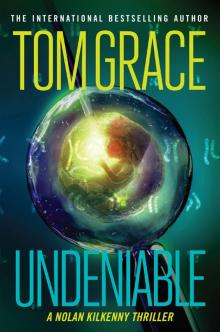 Undeniable
Undeniable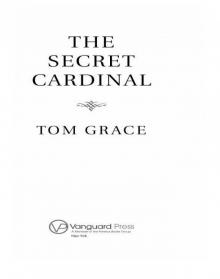 The Secret Cardinal
The Secret Cardinal Spyder Web
Spyder Web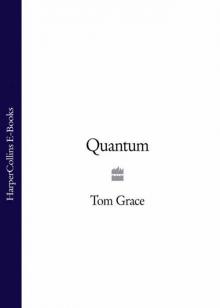 Quantum
Quantum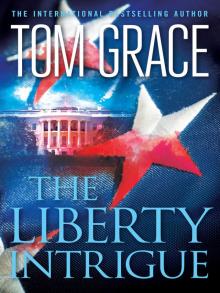 The Liberty Intrigue
The Liberty Intrigue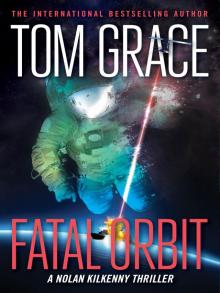 Fatal Orbit
Fatal Orbit